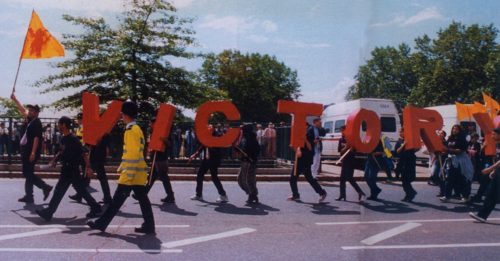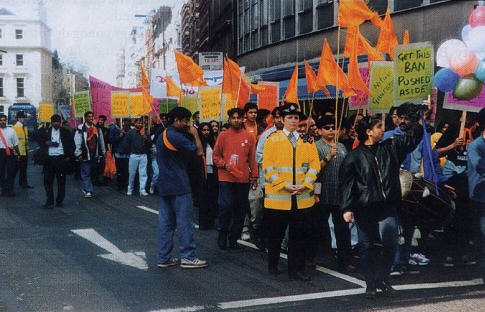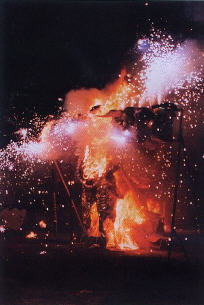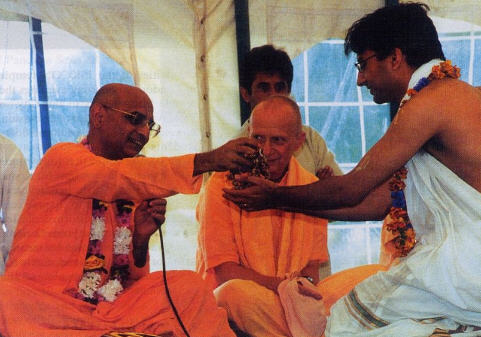
From saving Krsna's temple, to spreading Krsna's message
to other youth, Pandava Sena celebrates its tenth anniversary.
Pandava Sena is the student arm of ISKCON UK, and one of Britain's most dynamic youth groups. This year marks the tenth anniversary of the PS, as it is fondly known, formed initially as a protest body to save ISKCON's UK head quarters, the Bhaktivedanta Manor outside London.
Ten years on, PS aims to create a spiritual revolution. With members aged from fifteen to twenty-five, the group innovatively educates and engages youth in the Krsna conscious life through dynamic events and activities.
Though Pandava Sena has a majority British Asian membership, it also has many members from other backgrounds. Nine thousand people identify with Pandava Sena and attend its events around the world festivals, vacations, home programs, sadhanagroups, university events coordinated by about one hundred of its members.
Dawn of a New Era
"Get this ban pushed aside, build our road big and wide . . . Hare Krsna, Hare Krsna . . ."

Pandava Sena From ISKCON UK
The slogan was chanted throughout the streets of London. It was January 1994, and over ten years had passed in the battle to save Bhaktivedanta Manor from shutting down. With only ten weeks left before the prospective closure, the youth rallied together to make a statement.
Romapada Dasa, one of the group's inspirers, recalls the day Pandava Sena was established.
"I and two other young devotees Pradyumna Dasa and Navina Krsna Dasa outlined the goals, agendas, and structure of a youth group to specifically serve the campaign."
It was decided that the group would take the cause to the streets, the media, and the government.
Romapada adds: "Akhandadhi Dasa, the temple president at the time, approved the idea. And there it was. Our name: The Pandava Sena 'The Pandavas' Army.' Our symbol: the Hanuman flag."
The youth group's presence gave the whole campaign momentum and forced concerned people to realize the severity of the issue: If they didn't act, Bhaktivedanta Manor would close.
Pandava Sena's first rally was a candlelit vigil outside the London temple, followed by two protest marches before the Houses of Parliament. The first march attracted over 36,000 people. During the second march, as Big Ben struck 3:00 P.M. on May 12, 1994, Pandava Sena members and others led 5,000 people to throw themselves onto the streets before the Houses of Parliament, bringing central London to a standstill.
Sivarama Swami remembers: "I recall the exuberance of the Pandava Sena members as they returned to their buses after the event. Intoxicated with Lord Caitanya's mercy, they were chanting and dancing as they went along the road. I was thinking that it was for such service that Indians are scattered all over the world. Their duty is not academic or economic pursuits. They're meant to serve Lord Caitanya's mission. And when they follow this calling engage in their true dharma they taste real bliss. I hope Pandava Sena always engages in the Lord's service in that mood, and with such results."
The results? The government finally approved the right of public worship at Bhaktivedanta Manor, admitting its undeniable need and value.
From Campaigners To Practitioners

Members Work Together To Krsna-ize a Wall at ISKCON Spain
Created specifically to save the temple, the group had fulfilled its purpose. The question now was, Where do we go from here?
Navina Krsna, the chairman at the time, noticed the youths' natural attraction to chanting Krsna's names, and Pandava Sena transformed from a campaign group into a Krsna conscious youth group. Following a retreat in Ireland, "Jammin'" was established a weekly kirtana program. Then Pandava Sena spelled out its goals in the context of five projects:
Project Yudhisthira
To educate members in the philosophy and culture of Krsna consciousness.
Project Bhima
To safeguard Vedic values and give a spiritual perspective on modern issues.
Project Arjuna
To revolutionize university campuses with Krsna consciousness.
Project Nakula
To replicate the activities of Pandava Sena all over the world.
Project Sahadeva
To publish relevant and youthful material for the propagation of Krsna consciousness.
Krsna at the University
Srila Prabhupada emphasized that student life, a time when attachments and responsibilities are minimal, is the best time to cultivate spiritual knowledge and principles as a way of life. Pandava Sena's university activities began in 1996, and by 1998 "Vedic and Spiritual Arts Societies" were set up in London and Birmingham (later to be called "Krishna Consciousness Societies"). The Societies held discussions and intercollegiate festivals, with ISKCON leaders as guest speakers.
The beginnings were sweet; the vibrant youthful energy brought positive results. Eventually Pandava Sena put together a team of graduates dedicated to university programs. There are now programs at eighteen universities, including Oxford and Cambridge. The weekly programs involve discussions, yoga classes, lunchtime prasadam distribution, and trips to the temple. This year, for the first time, students attended a long-weekend retreat at Radhadesh, Belgium, that included seminars and workshops. Many British students now chant, read Srila Prabhupada's books, follow the regulative principles, and help run the Krishna Consciousness Societies.
Whether as diners at Govinda's Restaurant or as volunteer cooks and distributors for Food for Life, university students are engaging in the service of Sri Sri Radha-Londonisvara, the deities of the ISKCON temple in London. Wednesday evenings the temple hosts "Oasis in the City," a Pandava Sena program of discussion, kirtana, and prasadam for university students.
PS demonstrates that for a young person there is always time for Krsna. Members join with other devotees every Saturday night to chant in central London. Some perform dedicated service at the temple. From London, Pandava Sena has expanded steadily to major cities in England, and to the USA, Kazakhstan, Slovenia, and The Netherlands.
Festivals

Festival Of Dasera
Loud and lively festivals buzzing with energy are a Pandava Sena specialty, and blowing things up seems to be inbred. Dusshera, the festival honoring Lord Rama's slaying of the wicked Ravana, includes the burning of a huge effigy of the demon, along with music, drama, and fireworks. Holi, the dye-throwing festival of Radha-Krsna, is re-enacted with an enormous bonfire and, this year, the throwing of a quarter ton of dyed powder.
Bhaktivedanta Manor stages the largest Janmastami (Krsna's appearance) festival outside India, and PS hosts thousands of young pilgrims by staging dramas, multimedia presentations, and lots of kirtana.
Every Town and Village
Members joined Tribhuvanatha Dasa (who passed away in 2001) on the UK and Africa Hare Krsna festival tours, and continue to do so under Giridhari Dasa. Birmingham Rathayatra is also a youth festival. There's always a sleepless fun run up to the event, organizing everything from the chariots, stage show, and decorations, to funding, publicity, and media. Pandava Sena has been celebrating New Year's Eve ever since the first program in 1996, honoring the Srila Prabhupada Centennial. A PS Christmas day means gift-giving, comedy Christmas pantomimes, kirtana, and Christmas dinner. Pandava Sena also takes part in governmentendorsed festivals supported by the Oxford Centre for Hindu Studies.
Spiritual Practice
"Whatever position we're in," Tribhuvanatha Dasa told PS members some years ago, "we should use it to benefit others spiritually. So what that means in terms of Pandava Sena is that you have to sacrifice as much as you can, especially in your youth, to try to please Krsna and Srila Prabhupada."
There is a drive in Pandava Sena to become serious devotees. Many members chant sixteen rounds on their beads and follow the four regulative principles. Nitai Kirtana Dasa, a disciple of Jayapataka Swami, was the first Pandava Sena member to be initiated, and many more have followed suit.
Pandava Sena has been fortunate to receive direct instruction and care from many ISKCON leaders, especially Bhakti Caru Swami, Sivarama Swami, and Radhanatha Swami, as well as Tribhuvanatha Dasa. This summer, Urmila Devi Dasi spent ten days training Pandava Sena girls.
Vaisnava Training
"Caitanya Mahaprabhu says that there are really only two activities, a devotee should do," says Sacinandana Swami. "Become Krsna conscious and spread Krsna consciousness. I have always seen that the Pandava Sena group focuses on these two aspects by having spiritual programs and by making innovative and creative plans to spread Krsna consciousness."

Navina Krsna Dasa Receives Initation From HH Bhakti Caru Swami
A mentorship program has been set up to ensure that more experienced Pandava Sena members care for those who want to become more serious about spiritual life.
Dhruva Maharaja Dasa, the boys' mentorship secretary, says, "Guidance and training are formalized to ensure progressive advancement in spiritual life and loving relationships."
Last September, twelve members joined a training program hosted by Bhaktivedanta Manor. Rina Daya, one of the students, says, "The six-month program is to train young devotees to become strong preachers and develop a solid basis of devotional practice. It involves pilgrimages to Mayapur and Vrndavana, training at the Chowpatty temple in Mumbai, and study and training in the UK."
A ground-level course was started in 2003.
"The course gives Pandava Sena members a thorough understanding of Srila Prabhupada's teachings and solidifies their practices," says Dina Krsna Dasa, the course leader.
The weekly course consists of three manuals: Theology & Philosophy, Devotional Practices, and Vaisnava Culture.
Small Sadhana Groups also take place fortnightly across England for those wishing to undertake systematic study of the scriptures in an intimate local environment.
Krsna, exotic grounds in foreign lands, interactive seminars with brilliant speakers, kirtana, lots of prasadam, massive chanting sessions in major cities, and adrenalin-pumping activities for over 130 students are what constitute Pandava Sena annual retreats. Mixing fun with spirituality, they offer an experience of the temple environment and a summer vacation bubbling with energy.
"A high point in my life came when I was invited to give lectures at Pandava Sena retreats in Ireland," says Sacinandana Swami. "When I dance with Pandava Sena devotees in kirtana, I feel thirty years younger."
The first Pandava Sena retreat was in 1995, with Tribhuvanatha Dasa. The retreats have become bigger and better, with international destinations each year under the direction of former chairman Sandipan Krsna Dasa and Sonal Gathani.
Urmila Devi Dasi, a BTG editor and ISKCON educator, joined the Pandava Sena's 2003 retreat to Prabhupada Desh, Italy.
"All of us speakers encouraged the group to improve their spiritual life and avoid imitating Western youth," she says. "What I found really interesting was Bhakti Tirtha Swami's comments. He said that Prabhupada wanted to combine the best of the East (spiritual knowledge) with the best of the West (material advancement). This group Indian by heritage and to a large degree by culture, but raised in the West and living in the West exemplified Prabhupada's mission and were, he explained, the best hope for the future. I'd frankly never thought of Western-raised Indian youth in that light and felt very enlivened."
The first Pandava Sena retreat to the USA took place this summer. Pandava Sena UK joined members from New Jersey, New York, and Philadelphia in New Vrindavan, West Virginia, for a week of seminars, kirtana, sports, and lots of fun. The fifty-strong group was joined by Jayadvaita Swami, Bhakti Tirtha Swami, and Radhanatha Swami. In New York, Pandava Sena replicated Jammin'-style programs with American youth and visited places associated with Srila Prabhupada and the founding of ISKCON.
The Future is Here
Bhakti Caru Swami explained that spreading Krsna consciousness will occur through the youth. As world history shows, it only takes a few friends to begin a revolution. Pandava Sena projects like Jammin' and Krishna Consciousness Societies can be replicated in any town or village. We urge youth all over the world to use their ambition, courage, and intelligence to spread Krsna consciousness. We are the future, but will we make it on our own?
Nima Suchak is a freelance journalist, an early member of Pandava Sena, and part of the Bhaktivedanta Manor congregation.
Contributors to this article: Sandipan Krsna Dasa, Rangadevi Devi Dasi, Anupma Parihar, Dimpy Patel, and Yuvaraj Rana (Pandava Sena Chairman).
Start a Group
For information on starting a youth group in your area, contact Pandava Sena.
E-mail
Yuvaraj Rana, Chairman
uv@psena.com
Websites
UK: www.pandavasena.com
Amsterdam: www.pandavasena.nl
New Jersey: www.pandavasena.us
University Societies
